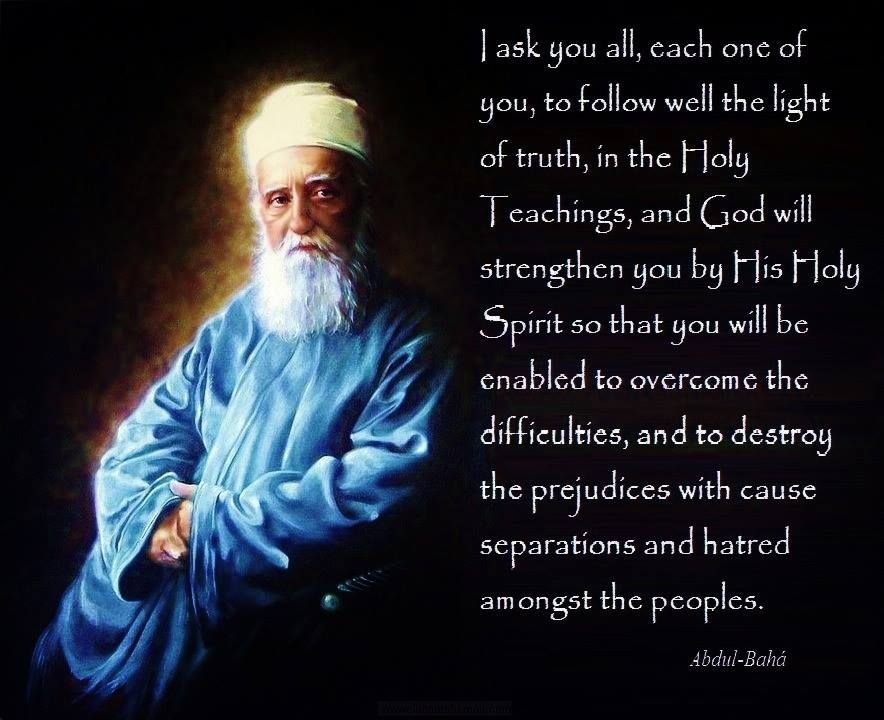The Bahá’í Faith, emerging from the rich tapestry of Persian religious thought in the 19th century, stands as a beacon of unity and inclusivity. Founded by Bahá’u’lláh, a prophet and messenger of God, this faith is characterized by its profound teachings, which not only elucidate the nature of God but also define the conduct and aspirations of humanity. To comprehend what it truly means to be a Bahá’í is to embark on a journey of understanding that interweaves spiritual principles, ethical commitments, and a vision for a united world.
At the heart of Bahá’í teachings lies the principle of the oneness of humanity, a poignant notion that echoes through the corridors of history and resonates with contemporary societal discourse. This tenet posits that all human beings belong to a single family, transcending the superficial barriers of race, nationality, and religion. This profound insight does not merely advocate for tolerance but implores adherents to actively foster environments rich in collaboration and respect. The recognition that diversity is not just a byproduct of existence but rather an asset to societal advancement forms the cornerstone of Bahá’í identity.
Equally significant is the Bahá’í perspective on the nature of God and religion. In Bahá’í belief, God is an unknowable essence, but through His Manifestations—prophets who appear throughout history—a wealth of teachings has been imparted. Figures such as Moses, Jesus, Muhammad, and Bahá’u’lláh himself are revered not merely as historical icons but as integral to humanity’s spiritual evolution. This lineage of prophethood underscores a dynamic revelation, where each faith builds upon the previous, weaving a continuous narrative aimed at human betterment.
The concept of progressive revelation suggests that the teachings of Bahá’u’lláh are not only relevant for his time but serve as an enduring guide that addresses the needs of a maturing civilization. This perspective engenders a duty among Bahá’ís to adapt and apply fundamental spiritual principles to contemporary challenges, promoting a proactive approach to social issues ranging from education to economic justice.
The ethical framework within which Bahá’ís operate is profoundly encapsulated in the principles of justice, equality, and service. Justice is considered not merely a judicial ideal, but a moral imperative that permeates all aspects of life. In a world rife with inequity, Bahá’í teachings emphasize the necessity of establishing systems where fairness prevails, and the rights of every individual are affirmed. Adherents are urged to embody justice in their personal dealings and to advocate for societal structures that uplift the marginalized and disenfranchised.
Bahá’ís also espouse the principle of equality between men and women. This assertion is not simply an endorsement of gender parity but an acknowledgment of the pivotal role women play in advancing societal progress. The empowerment of women is viewed as essential for the holistic development of humanity, for it is through the full participation of both genders that a balanced society can emerge.
In practical terms, being a Bahá’í involves engaging in community, service, and personal development. Regular attendance at devotional gatherings fosters a sense of belonging while reinforcing spiritual practices. The community is not merely a support system; it is a dynamic entity where individuals are encouraged to cultivate their talents and contribute meaningfully. Service to humanity is both a personal and collective endeavor, as Bahá’ís undertake initiatives that address local and global concerns. Whether through educational programs or humanitarian efforts, the commitment to serve humanity is paramount and reflective of the teachings of Bahá’u’lláh.
Moreover, the emphasis on education is a vital aspect of Bahá’í life. Education is viewed as a divine obligation, not only for personal development but for the betterment of society. Bahá’ís are encouraged to pursue knowledge in a myriad of fields while simultaneously recognizing that true education transcends formal outlets. The cultivation of virtues, moral grounding, and the development of a reflective mindset constitute fundamental elements in the Bahá’í conception of learning.
A noteworthy nuance exists in the Bahá’í approach to the intersection of religion and science. Rather than portraying these disciplines as antagonistic, Bahá’í teachings advocate for their harmonious coexistence. The pursuit of scientific inquiry is seen as a pathway to understand the divine creation, and the discoveries of science are perceived as complementary to spiritual truths. This synthesis calls for Bahá’ís to cultivate a worldview steeped in reason and faith, recognizing that both dimensions serve to enhance human comprehension and societal advancement.
In contemplating what it means to be a Bahá’í, one must acknowledge that this faith does not exist in a vacuum but is deeply engaged with the wider world. The Bahá’í community actively advocates for peace, cooperation, and dialogue among diverse groups, underscoring a belief in the potential for global unity. This commitment to fostering international connection is particularly relevant amidst the fractious dynamics of the contemporary geopolitical landscape, where division often overshadows solidarity.
Ultimately, the journey of a Bahá’í is one of continuous exploration, seeking to align personal aspirations with the ideals of justice, unity, and service. It is a path that invites individuals not only to reflect upon their own lives but also to engage actively in the broader quest for a more harmonious and equitable society. The teachings offer an illuminating lens through which to understand the complexities of the human experience while fostering a profound sense of responsibility for collective well-being. Through unwavering commitment to these principles, Bahá’ís strive to manifest a world where peace and unity prevail, thus exemplifying their faith’s central tenet of oneness. The call to action is as compelling as it is transformative; it beckons individuals to contribute to an ever-progressing narrative in humanity’s journey towards its highest potential.
